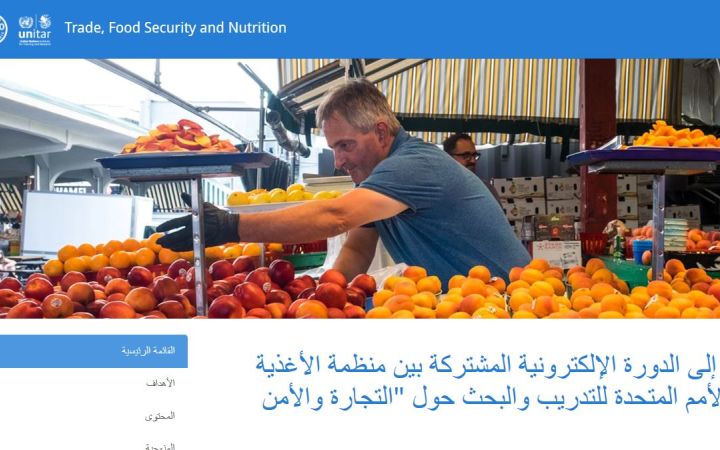27 February 2023, Geneva, Switzerland - The United Nations Institute for Training and Research (UNITAR) and the Regional Office for the Near East and North Africa of the Food and Agriculture Organization of the United Nations (FAO) have launched a Call for Applications for their joint online course on Trade and Food Security which will take place from May 28 to June 22, 2023. The course will be facilitated by experts and delivered fully in the Arabic language in an asynchronous manner.
This is the second edition of the course to accommodate the large demand from the region following the successful launching of the course in October 2021.
The course aims to strengthen Arabic-speaking countries' capacity, develop and implement evidence-based trade policies, and formulate and negotiate trade agreements, taking into consideration their needs for economic growth and structural transformation, as well as their food security concerns.
In the preparation of this course, FAO draws from its extensive experience in providing guidance, capacity building and technical advice to its member countries on the topics of Trade and Food Security, Agricultural trade policy and Multilateral trade negotiations, as well as its normative work on the SPS issues.
Objectives and Target Audience
The course is designed to assist representatives from the Government and related authorities, who are directly involved in the formulation and implementation of agricultural policies and programs in Arabic-speaking countries. These may include officials from Ministries of Agriculture, Livestock, and Fisheries; Ministries of Trade, Commerce, and Industry; Ministries of Finance, Economy; and Food Safety, Sanitary, Phytosanitary, Veterinary, and other authorities in the Near East and North Africa (NENA) region.
In particular, the course aims to reach out to officials and representatives from Algeria, Bahrain, Egypt, Iraq, Jordan, Kuwait, Lebanon, Libya, Mauritania, Morocco, Oman, Palestine, Qatar, Saudi Arabia, Sudan, Syrian Arab Republic, Tunisia, United Arab Emirates, and Yemen.
Food Security in the Near East and North Africa (NENA) Region
The relationship between trade and food security is attracting increased attention on both the trade and the development agendas. The eradication of global hunger by 2030 is a key goal in the 2030 Agenda for Sustainable Development, and trade is recognized as one of the means to achieving the SDGs. The challenge is how to ensure that the expansion of agricultural trade works for and not against, the elimination of hunger, food insecurity and malnutrition.
This challenge has been at the forefront as governments’ struggle to negotiate the changes to the current global agreements on agricultural trade that are needed to ensure that trade results in enhanced food security.
The increasing need for trade experts to support trade related development agenda in the region has posed a major challenge. In most cases, national and regional institutions do not have the technical capacity and resources to map out national, sub-regional and regional level trade priorities and constraints; to empirically assess the implications of their multiple memberships on trade and Food Security; to formulate appropriate mitigation policies and strategies; or to negotiate trade agreements that boost gains from trade and specialization.
Register now. The Course is Free but Limited Slots are available
This course is offered free of charge as part of FAO’s support to Member countries in the NENA region and will be conducted in the Arabic language over a period of four weeks. The course will be delivered online via UNITAR’s e-learning platform.
Limited slots are available and will be subject to a selection process conducted by FAO, taking into consideration, the geographical and institutional distribution as well as gender balance. To receive the final confirmation of selection, participants will be requested to obtain permission to participate in the course from their direct supervisor.
A UNITAR- FAO Certificate of Completion will be issued to participants who complete all course-related assignments and assessments.
For more information and online registration, please visit UNITAR’s website at: https://tfs23arabic.unitar.org/
Registration deadline is May 14, 2023, or while slots are available. Please register early. Female candidates are strongly encouraged to apply.
Feedback from previous NENA Region joint UNITAR-FAO course
Previous versions of this joint course have been successfully conducted with the most recent Near East and North Africa (NENA) region version of the course being in 2021. Participants from the previous NENA version of the course indicated they were satisfied with the learning objectives, as they were clear and relevant to them. The participants also found the assessment activities and the methodology used effective, as they considered the assessment activities as an effective tool to facilitate learning. Participants indicated the methodology was effective, as it is well planned, easy to follow, and enabled peer learning. The participants also indicated the mentors were effective as they encouraged active participation and created an enriching atmosphere of exchanges and interaction. The module structure was valued highly by the participants, as they indicated they were concise and informative, easy to understand and well structured. Overall, participants indicated the course was relevant to their job and they would apply what they learned in the future. The participants indicated they would recommend the course to their colleagues as it was a great learning experience.
Impact Stories of Previous joint UNITAR-FAO courses
About the FAO-UNITAR Partnership
The United Nations Institute for Training and Research (UNITAR) and the Food and Agriculture Organization of the United Nations (FAO) has a long-standing collaboration aimed at expanding access to education and training to strengthen the capacities of stakeholders, with training activities on a wide range of topics being implemented since 2010.
The partnership builds upon the strengths of both institutions by transforming the knowledge expertise provided by FAO into high-quality learning products and services designed to transfer knowledge, impart skills and raise awareness and takes full advantage of modern information and communication technology (ICT) for greater outreach and cost-effectiveness.


